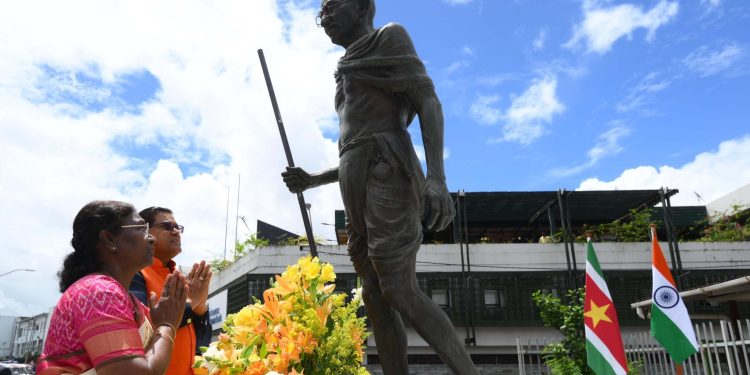President Droupadi Murmu has declared that India will expand the eligibility criteria for the Overseas Citizen of India (OCI) card in a significant development highlighting the deep-rooted bilateral relationship between India and Suriname. This expansion will now encompass original Indian immigrants in Suriname, extending from the fourth generation to the sixth generation.
President Murmu made this announcement during her address at Independence Square, accompanied by Suriname counterpart Chandrikapersad Santokhi. The event, commemorating 150 years since the arrival of Indians in Suriname, also featured a vibrant cultural celebration.
The historic journey began on June 5, 1873, when the first ship named Lalla Rookh arrived in the Surinamese capital, Paramaribo, carrying 452 Indian labourers. Most of these labourers hailed from the eastern regions of Uttar Pradesh and Bihar in India. The decision to extend the eligibility criteria for the OCI card signifies the significance of the Indian diaspora and their enduring contribution to the longstanding relationship between India and Suriname.
In a momentous announcement during the commemoration of 150 years of Indian migration to Suriname, President Droupadi Murmu expressed her immense satisfaction as she declared the approval of an extension in the eligibility criteria for the Overseas Citizenship of India (OCI) card.
Murmu emphasised the significance of the OCI card as a vital link in their longstanding 150-year-old relationship with India. She urged members of the Indian diaspora to actively preserve their ties with India, encouraging them to make ongoing efforts in this regard.
Previously, there existed a limitation that restricted the issuance of OCI cards solely to the first four generations of the original Indian immigrants who migrated from India to Suriname. Consequently, this exclusion resulted in many young individuals belonging to the fifth and subsequent generations being deprived of the benefits associated with the OCI card.
“We have gathered here today to commemorate a significant milestone in the history of Suriname—the 150th Anniversary of the arrival of Indians in this nation. It is a momentous occasion that deserves our recognition and respect for our ancestors, as well as our appreciation for those who contributed to the development of this country,” President Droupadi Murmu expressed.
She acknowledged Suriname as a multicultural society and a land of opportunities, where diverse communities from various backgrounds have been welcomed and integrated. Over the years, these communities have come together to form a united family and a cohesive nation. President Murmu commended the people of Suriname for their unwavering dedication to unity and inclusiveness.
The President expressed her delight in observing the continued attachment of the Indian diaspora to their ancestral roots, despite the vast geographical distances, different time zones, and cultural diversity. She emphasised the striking similarities between India and Suriname, both known for their rich diversity. The people of both nations have seamlessly integrated into each other’s societies, creating a sense of belonging and familiarity. President Murmu even remarked, “I feel like I am at my own home!”
She emphasised that over the course of the past 150 years, the Indian community has not only become an integral part of Surinamese society but has also played a crucial role in strengthening the partnership between India and Suriname.
President Murmu highlighted the solidarity and reverence exhibited by India towards Suriname as the nation celebrates the legacy of its ancestors and their profound connections with India.
The President acknowledged the shared experiences of both Suriname and India in rebuilding their economies and social systems after enduring periods of colonial rule. This shared history has fostered a deep sense of solidarity between the two nations. Furthermore, President Murmu underlined that the bilateral relations between India and Suriname are founded on shared aspirations for development.
Expressing her hopes for the future, she urged the Indian community to continue strengthening the relationship between India and Suriname, acting as a bridge that connects both nations. She extended an invitation to all community members to visit India, witness its remarkable journey of development, and actively participate in it.
On Monday, President Droupadi Murmu began her day by paying homage at the Baba and Mai monument, a symbolic representation commemorating the first Indian man and woman to set foot in Suriname. Following that, she proceeded to pay her respects at the Mama Sranan monument, which symbolises Mama Sranan, the Mother of Suriname, cradling her five children, representing the five ethnicities residing in Suriname, with care and affection.
President Murmu also attended a luncheon banquet, graciously hosted in her honour by the President of Suriname. During her banquet speech, President Murmu emphasised India’s approach to fostering an inclusive world order that takes into account the legitimate interests and concerns of every country and region.
The state visit to Suriname marks President Murmu’s first visit since assuming office in July of the previous year, and she arrived in Suriname on Sunday for the three-day visit.










